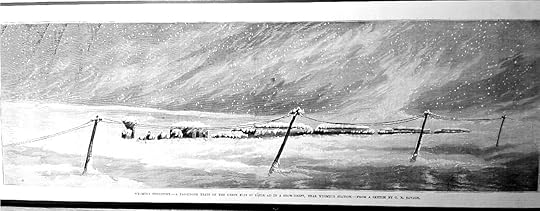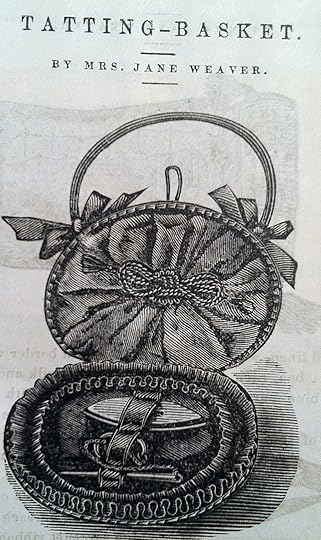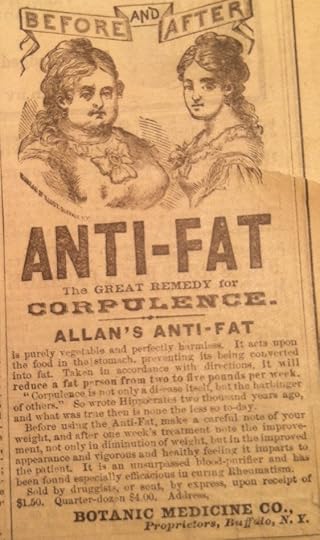LOSING THE WEIGHT OF WORDS
This past Christmas my daughter, knowing her mother’s fanaticism about owning anything to do with the Old West, bought me something that was within her budget and definitely within my scope of interest. It is a wood engraved illustration from Frank Leslie’s Illustrated Newspaper, March 30th, 1872. It depicts ’Wyoming Territory—A Passenger Train of the Union Pacific Railroad in a Snow-Drift, Near Wyoming Station’ from a sketch by C. B. Savage.  While the illustration is soon to be framed and find a place on my wall, I was also fascinated by the accompanying news article, which uses a language not often employed in modern journalism. “The actual troubles of east-bound passengers began at Ogden. Previous to reaching that point, the travelers were quite jolly over the novel garb that nature had assumed, and fashioned brilliant stories to please and excite their far-away friends. But…when provisions grew scarce, and patience rebellious…and the huge drifts swept revengefully over the trains…when the game and song, the story and flirtations had lost their charms…” You get the picture. The newspaper was a weekly illustrated literary and news magazine which ran from 1852 until 1922. During that time it covered news stories from the Civil War through WWI, and its illustrations evolved from engravings like mine through photographs and early cover illustrations by Norman Rockwell.
While the illustration is soon to be framed and find a place on my wall, I was also fascinated by the accompanying news article, which uses a language not often employed in modern journalism. “The actual troubles of east-bound passengers began at Ogden. Previous to reaching that point, the travelers were quite jolly over the novel garb that nature had assumed, and fashioned brilliant stories to please and excite their far-away friends. But…when provisions grew scarce, and patience rebellious…and the huge drifts swept revengefully over the trains…when the game and song, the story and flirtations had lost their charms…” You get the picture. The newspaper was a weekly illustrated literary and news magazine which ran from 1852 until 1922. During that time it covered news stories from the Civil War through WWI, and its illustrations evolved from engravings like mine through photographs and early cover illustrations by Norman Rockwell.
As the newspaper progressed and changed so, no doubt, did its language. Language like clothing changes with time. I, as a woman, am no longer in need of the millinery goods advertised on the back of the article and I wouldn’t wear an organdy tunic even if it were trimmed with lace. Nor would I talk or write in such  a flowery style. Heading over to Peterson’s Magazine, the story is similar. Peterson’s was started by the same team who published The Saturday Evening Post, although it obviously didn’t last quite so long. It began in 1842 as a cheaper version of the popular Godey’s Lady’s Book, sort of the Mademoiselle to Vogue perhaps? My August, 1873 issue contains patterns for such essentials as a ‘Lady’s Seaside Jacket’ and a ‘Tatting Basket,’
a flowery style. Heading over to Peterson’s Magazine, the story is similar. Peterson’s was started by the same team who published The Saturday Evening Post, although it obviously didn’t last quite so long. It began in 1842 as a cheaper version of the popular Godey’s Lady’s Book, sort of the Mademoiselle to Vogue perhaps? My August, 1873 issue contains patterns for such essentials as a ‘Lady’s Seaside Jacket’ and a ‘Tatting Basket,’  while my August, 1878 edition has a song titled ‘Yesterday.’ “We stood amid those bow’rs,/When last I wept adieu,/ Surrounded by fair flowers,/Of many a brilliant hue…“ Paul McCartney it ain’t. So this leads me to the question: Why, when we are basically still speaking the same English, using the same words (more or less) are we not writing in such florid phrases? This is not just a question of usage, of alright vs all right, or of words being employed in ways they hadn’t previously been used (I’ll buy that!), or of words no longer being spoken because they have taken on alternative meanings, e.g. “gay.” It’s a question of fashion in the use of words. We talk about the vitality of the English language, how it continues to adapt, accept new words from other languages, moderate the use of still others while continuing to ‘invent’ still more. Yet in truth, the way we speak and write those words has somehow become pared down, the figures of speech more direct, similes and metaphors more restrained.
while my August, 1878 edition has a song titled ‘Yesterday.’ “We stood amid those bow’rs,/When last I wept adieu,/ Surrounded by fair flowers,/Of many a brilliant hue…“ Paul McCartney it ain’t. So this leads me to the question: Why, when we are basically still speaking the same English, using the same words (more or less) are we not writing in such florid phrases? This is not just a question of usage, of alright vs all right, or of words being employed in ways they hadn’t previously been used (I’ll buy that!), or of words no longer being spoken because they have taken on alternative meanings, e.g. “gay.” It’s a question of fashion in the use of words. We talk about the vitality of the English language, how it continues to adapt, accept new words from other languages, moderate the use of still others while continuing to ‘invent’ still more. Yet in truth, the way we speak and write those words has somehow become pared down, the figures of speech more direct, similes and metaphors more restrained.
I’m not “weeping adieu” here to such extravagantly embellished phrases as those above, but perhaps we are losing something in going for the ‘quick fix,’ the direct approach in English usage. Are we not losing  words? I read recently that readers no longer have time to ascertain the meaning of obscure words; they do not want to be made to feel as if they are doing homework. Writers are competing with television, internet, video games and a host of other distractions which are not as ‘taxing’ perhaps as reading a well-written novel and can more easily be put aside as time permits. So what effect will this have on English usage?
words? I read recently that readers no longer have time to ascertain the meaning of obscure words; they do not want to be made to feel as if they are doing homework. Writers are competing with television, internet, video games and a host of other distractions which are not as ‘taxing’ perhaps as reading a well-written novel and can more easily be put aside as time permits. So what effect will this have on English usage?
One further idea that struck me while strumming through the bunch of ancient newspapers in my possession was that our concerns don’t seem to have changed very much, despite the evolution of fashions in and out of language. On the cover of London Opinion from 23 September, 1911, there is a series called ‘Whipped Topics.” One of the topics, which I believe we would today call “News Briefs,” states, “Paris has started an anti-talking machine league…” Sounds to me just like an anti-cell phone or anti-texting movement. OK, so the ads are, on the whole, out-dated: “Don’t Wear A Truss!” one screams while a section called ‘Masculine Modes’ deals with bowler hats and turn-ups (cuffs to Americans) on trousers. Yet the one titled, ‘How I Permanently Removed My Superfluous Hair’ resonates as something still seen in women’s magazines. And this ad for weight loss  may not look modern but don’t these still appear today? Yet listen to the language and keep in mind that these words are not considered archaic today but…would they be used in an ad? “The Great Remedy for Corpulence: …Corpulence is not only a disease itself, but the harbinger of others….note the improvement, not only in the diminution of weight, but in the improved appearance and vigorous and healthy feeling it imparts…It is an unsurpassed blood-purifier and has been found especially efficacious…”
may not look modern but don’t these still appear today? Yet listen to the language and keep in mind that these words are not considered archaic today but…would they be used in an ad? “The Great Remedy for Corpulence: …Corpulence is not only a disease itself, but the harbinger of others….note the improvement, not only in the diminution of weight, but in the improved appearance and vigorous and healthy feeling it imparts…It is an unsurpassed blood-purifier and has been found especially efficacious…”
When was the last time you heard someone talk about his corpulence problem or speak of something that was efficacious to his health? Writers do often use words that they wouldn’t employ in everyday speech, and the S.A.T. English exams contain words students must learn—only to never practice them again. Why is that? It’s not as if the language is finite, that when new words are invented, old words must die.
So, is there a dumbing down of the English language? Are we losing words?





